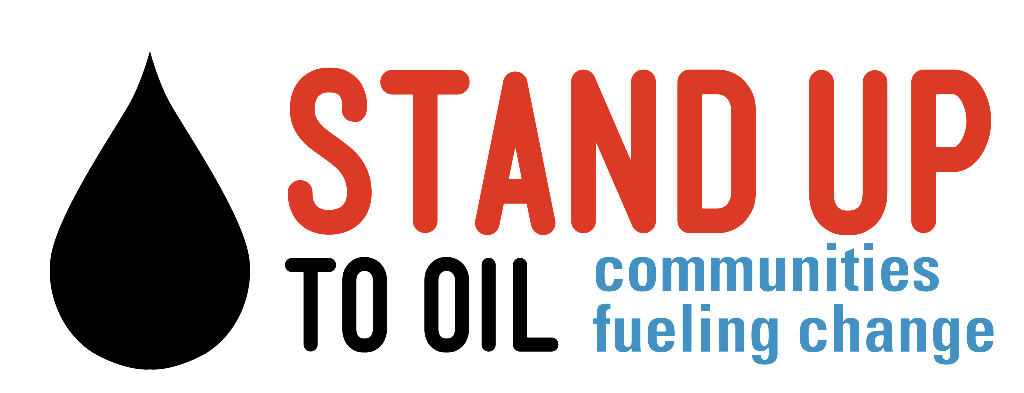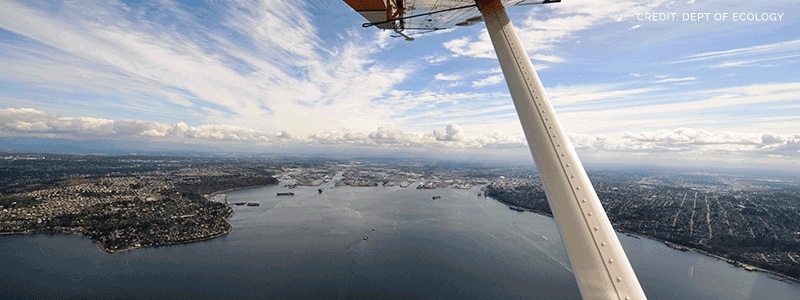Dear Mayor Woodards, Deputy Mayor Blocker, and Tacoma City Council Members,
As environmental, faith, and community organizations working across the Northwest to protect the health and safety of our communities from the risks of oil transport, the undersigned 29 organizations urge the City of Tacoma to renew and strengthen the Tideflats Interim Regulations to include bans on expansions of existing high risk facilities.
The impacts of Tacoma City Council’s decisions regarding Tacoma’s land use and fossil fuel development extend far beyond the South Sound. Hazardous oil trains destined for U.S. Oil and SeaPort Sound Terminal not only pass through Tacoma and Pierce County, but through countless communities in the Northwest–including in Idaho, Spokane, and communities along the Columbia River Gorge–posing an acute risk of spills and explosions each step of the way. Indeed, the 2016 derailment of an oil train in Mosier, Oregon en route to Tacoma spilled 42,000 gallons of oil, ignited a toxic 14-hour fire of Bakken crude oil, and forced evacuations of the nearby community including prompting an early end to the school year due to disruptions to essential services.
Communities across Puget Sound also face increased oil spill risks from oil barges traveling weekly from Canada to U.S. Oil. With their recent purchase of U.S. Oil, Par Pacific has also already increased shipments of crude oil out from the facility with stated intentions to expand these operations, posing oil spill and vessel traffic threats to all of Puget Sound’s shoreline communities.
Many of our organizations have been fighting for the better part of a decade against new crude oil terminals and dangerous oil transport through our communities. Expansions of crude oil storage and transloading in Tacoma would only undermine this work and further endanger our health and safety as our communities are used as corridors for oil transport. Like many of the proposals in our own communities, prospective expansions of fossil fuel facilities in Tacoma are rarely needed or intended to serve local demand or refined fuel needs. Rather, these proposals are typically focused on getting crude oil from inland sources to Northwest port communities in order to transload and export to markets across the Pacific, at the expense of our local health and safety, and largely to the sole benefit of big oil and gas companies. We have seen these contentious fights play out time and again across the Northwest from Portland and Port Westward, Oregon to Vancouver and Grays Harbor, Washington to great outcry from local communities.
Tacoma’s existing Interim Regulations are a critical protection and must be renewed, but do not go far enough to protect against the pressing threat of expansions of existing facilities, which result in the very same health and safety impacts as new facilities. We know the fossil fuel industry continues to target Tacoma for dangerous new oil and gas projects. In the last year, Tacoma has seen industry interest in a new oil transloading facility and a chemical plant exploring converting to store bulk fossil fuels. By preventing these dangerous proposals, the current Interim Regulations are working. However, these same kinds of projects could easily be proposed and approved as expansions of existing facilities with no additional oversight or protections. For example, U.S. Oil shipped out 176% more crude oil in the 4th quarter of 2019 than the 4th quarter of 2016 – and all of it went to Hawaii, signaling a change in use of the facility from a refinery to a crude oil export hub. Further, under the existing Interim Regulations, SeaPort Sound was recently approved for a new land use permit that allowed them to double the number of crude oil rail cars it can bring through Tacoma–allowing them to unload a staggering 26,122 rail cars carrying 16.9 million barrels of crude oil annually. This inconsistency is dangerous and leaves Tacoma–and our entire region–at risk of becoming a fossil fuel export hub.
The need for Interim Regulations that protect the health and safety of Tacoma is clearer than ever as the COVID-19 public health and economic crisis reveals the inequities and vulnerabilities of our economic systems. Just as people of color and low-income communities are most likely to suffer the worst health consequences of COVID-19, so are these same communities most disproportionately impacted by the health impacts of fossil fuels. And these connections are not coincidental–among many social factors, low income people and people of color are more exposed to industrial pollution and suffer higher rates of underlying respiratory and cardiovascular conditions such as asthma and hypertension that make them even more vulnerable to COVID-19. Tacoma’s valuable industrial land can and must be used to their highest use to drive local economic development. However, industries that endanger both our local economic vitality and our health only exacerbate our vulnerability to future crises, and should not be our aspiration as we work to recover from this emergency.
The Interim Regulations and Subarea Plan can be a road map for how Tacoma and Pierce County will guide a recovery toward a cleaner, healthier, and more equitable economy. In this exceptional and uncertain time, we urge you to renew and strengthen the Tideflats Interim Regulations and demonstrate visionary leadership to build a local economy that strengthens the health and wellness of all our communities.
Sincerely,
Matt Nykiel
Idaho Conservation League
Helen Yost
Wild Idaho Rising Tide
Mike Petersen
The Lands Council (Spokane, WA)
Dan Serres
Columbia Riverkeeper
Michael Lang
Friends of the Columbia Gorge
Emilia Ponti
Mothers for a Safe Columbia County
Damon Motz-Storey
Oregon Physician for Social Responsibility
Daphne Wysham
Sustainable Energy & Economy Network
Elijah Cetas
Center for Sustainable Economy
Sam Krop
Cascadia Wildlands
Allie Rosenbluth
Rogue Climate
Melissa Malott
Citizens for a Health Bay
Dan Villa
350 Tacoma
Dylan Ruggeri
Sunrise Tacoma
The Climate Reality Project: Tacoma, WA Chapter
LeeAnne Beres
Earth Ministry/ Washington Interfaith Power & Light
William McPherson
Unitarian Universalist Church State Action Network
Sarah Cornett
Washington Physicians for Social Responsibility
Victoria Leistman
Sierra Club
Anna Doty
Washington Environmental Council
Washington Conservation Voters
Stacy Oaks and Jess Wallach
350 Seattle
Lovel Pratt
Friends of the San Juans
Chris Rilling
Puget Soundkeeper Alliance
Eddy Ury
RE Sources for Sustainable Communities
Marcie Keever
Friends of the Earth
Matt Krogh
Stand.earth
Tammy Domike and Jean Davis
Citizens for a Clean Harbor (Grays Harbor)
Janet Strong
Grays Harbor Audubon Society
Kriss Kevorkian
Legal Rights for the Salish Sea

